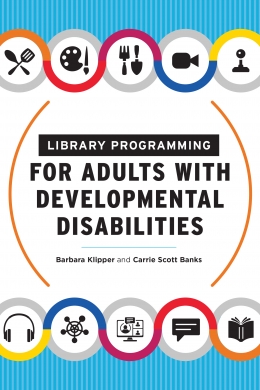Primary tabs
You don't need to be an ALA Member to purchase from the ALA Store, but you'll be asked to create an online account/profile during checkout to proceed. This Web Account is for both Members and non-Members. Note that your ALA Member discount will be applied at the final step of the checkout process.
If you are Tax-Exempt, please verify that your account is currently set up as exempt before placing your order, as our new fulfillment center will need current documentation. Learn how to verify here.
- Description
- Table of Contents
- About the authors
- Reviews
Programming staff, library administrators, and LIS instructors will find this an easy-to-read handbook for understanding the needs of adults with developmental disabilities and the principles that undergird the best practices the authors describe.
Public libraries everywhere have embraced inclusion and expanded their programming for youth with disabilities, especially autism. It’s imperative that libraries also offer rich and age-appropriate initiatives for adults with developmental disabilities; after all, as youth now served by their libraries grow up and reach adulthood, they will continue to want and expect libraries to be responsive to their needs. Klipper and Banks, two librarians with a long-standing focus on inclusivity, combine research-based theory and an introduction to best practices with details on how to replicate field-tested programs for adults with developmental disabilities (DD). Readers will
- learn key ideas about DD, such as an examination and debunking of commonly held stereotypes and misconceptions about people with DD and the role ableism plays in perpetuating them;
- be introduced to self-advocates and their ways of viewing DD, including terminology and the Neurodiversity movement;
- get pointers on how to create a culture of inclusion at the library, with discussions of Universal Design and UDL, staff training, and anticipating the unexpected;
- explore the needs of adults with DD who are also LGBTQA+, people of color, immigrants and English language learners, seniors, those with dual diagnoses, and other aspects of intersectionality in library programming;
- understand how to build on and modify existing children’s and YA practice to ensure that library users with DD receive age-appropriate and respectful library service;
- learn how to make virtual programming accessible and which programs can be successfully brought online;
- discover a myriad of programs ready to adapt for their own libraries, such as Sensory Storytime for adults, book clubs, arts and crafts programs, adaptive gaming, job skills workshops, cooking programs, and many more;
- see how programming for adults with DD works in academic libraries; and
- gain skills for outreach and keeping current, with guidance on forming and strengthening partnerships, advocacy, fundraising, marketing, and additional resources for deepening knowledge of DD.
Acknowledgments
Introduction
Part I Developmental Disabilities, Inclusion, and Supports
Chapter 1: Perception and Self-Perception
Chapter 2: Creating a Culture of Inclusion
Chapter 3: Accessibility Tools and the Library Environment
Part II Preparing for Programming
Chapter 4: Determine Programming Needs
Chapter 5: Working with Stakeholders
Chapter 6: Collaborating Across Departments
Chapter 7: Training for Inclusion
Chapter 8: Funding, Marketing, and Evaluating Programs Part III Programs to Try
Chapter 9: Virtual Programs and Services
Chapter 10: Library and Literature-Based Programs
Chapter 11: Materials for Adults with DD
Chapter 12: Art, Craft, and Maker Programs
Chapter 13: Performing Arts Programs
Chapter 14: Gaming, Board Game, and Escape Room Programs
Chapter 15: Social Connection and Wellness Programs
Chapter 16: Adulting Programs
Chapter 17: Programs that Support Post-Secondary Education and Employment
Conclusion: Next Steps and Twenty Best Practices
Appendix A: Resources for Programming, Outreach, and Training
Index
Barbara Klipper
Barbara Klipper, a retired librarian, has championed library access for people with disabilities since 2002 when she worked at The Ferguson Library in Stamford, CT. Her book Programming for Children and Teens with Autism Spectrum Disorder was updated by Dr. Amelia Anderson in 2021. With Carrie Scott Banks, she co-authored “Staying Calm: Disabilities and ‘Behavior’ in the Library” in Differing Abilities and the Library: Fostering Equity for Patrons and Staff with Disabilities, edited by C.A. Copeland, PhD. With Ronda Shapiro-Rieser, she published The Secret Rules of Social Networking in 2015. She is also the creator and funder of the Autism Welcome Here grant.
Carrie Scott Banks
Carrie Scott Banks has been in charge of Brooklyn Public Library’s Inclusive Services since 1997 and taught Including Youth with Disabilities at Pratt Institute from 2013 to 2015. In 2012 she was named a Library Journal Mover & Shaker. Active in ASGCLA and ALSC since 2000, she was the 2020 President of ASGCLA. In 2014, she substantially revised Including Families of Children with Special Needs: A How to Do It Manual for Librarians. Libraries and Garden: Growing Together, written with Cynthia Mediavilla, was published in the Spring of 2019.
"The writing is clear and practical and reflects both deep knowledge and strong advocacy. Their checklists, best practices tips, and extensive resources are very useful. Especially as many library workers have not had extensive training in programming for adults with developmental disabilities, this book will be very welcome. Indeed, the ideas are applicable to many kinds of programming and model universal design."
— Booklist



